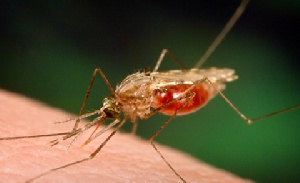Businesses in Ghana lost about GHC20 million to malaria infections in 2014, according to a joint study conducted by the National Malaria Control Programme and School of Public Health of the University of Ghana.
The study, which covered 62 businesses in the Greater Accra, Ashanti and Western regions, said 90 per cent of total cost was spent on malaria treatment and 10 per cent as a result of productivity losses due to absenteeism of employees.
Mr Tetteh Ogum, the Business Technical Adviser of the Private Sector Malaria Prevention (PSMP) Project, who disclosed the outcome of the study, advocated an increase in private sector investment in malaria prevention and control.
Mr Ogum was speaking at a stakeholder’s advocacy meeting organised by the PSMP, a malaria control programme held in Sunyani and attended by farmer groups as well as municipal and district officers of Agriculture in the Brong-Ahafo Region.
The PSMP is a three-year advocacy project of the United States John Hopkins Centre for Communication Programmes being implemented in the country to harness active private sector engagements and support towards malaria control in the country.
It is being funded by the United Kingdom’s Department for International Development (DFID).
The study further revealed that an average of 0.5 per cent of businesses’ annual corporate returns was spent on malaria treatment for employees and their dependants.
Mr Ogum said malaria prevention practices such as distribution of Long Insecticides Treated Nets (LLINs), employee education and encouraging regular use of LLINs would lead to malaria free future.
He said the private sector must collaborate with other major national and multi-national companies to become malaria-safe, and thus help reduce the burden of the debilitated disease on their businesses.
Malaria-safe businesses in Ghana would pave the way for better health, a more productive workforce and increased bottom lines.
Globally, Mr Felix Nyanor-Fosu, the Chief of Party of the PSMP, said malaria infections reduced by 50 per cent, according to the 2017 World Health Organisation (WHO) Report.
Malaria mortality among less than five years also reduced by 55 per cent, he said, and advised people to sleep under treated nets to prevent malaria.
Dr Saviour Denueme, the Brong-Ahafo Regional Veterinary Officer, noted that malaria remained a national burden as it accounted for about 38 per cent of all Out-Patient Department (OPD) cases in health facilities.
The impact of malaria on farm and agri-business could be devastating as it could strike farmer communities at critical planting, weeding and harvesting times, leading to low productivity, he said.
Productivity is reduced due to sick workers, and workers who care for sick family members to the neglect of their farms.
Dr Denueme lauded the implementation of the Planting for Food and Jobs Programme, which is expected to increase agricultural production by additional 14.9 metric tonnes between 2017 and 2020.
He observed that the target could be achieved if farmers remained healthy, and called on the National Malaria Control Programme to distribute more treated nets to the farmers to prevent malaria.
Health News of Wednesday, 21 November 2018
Source: ghananewsagency.org













